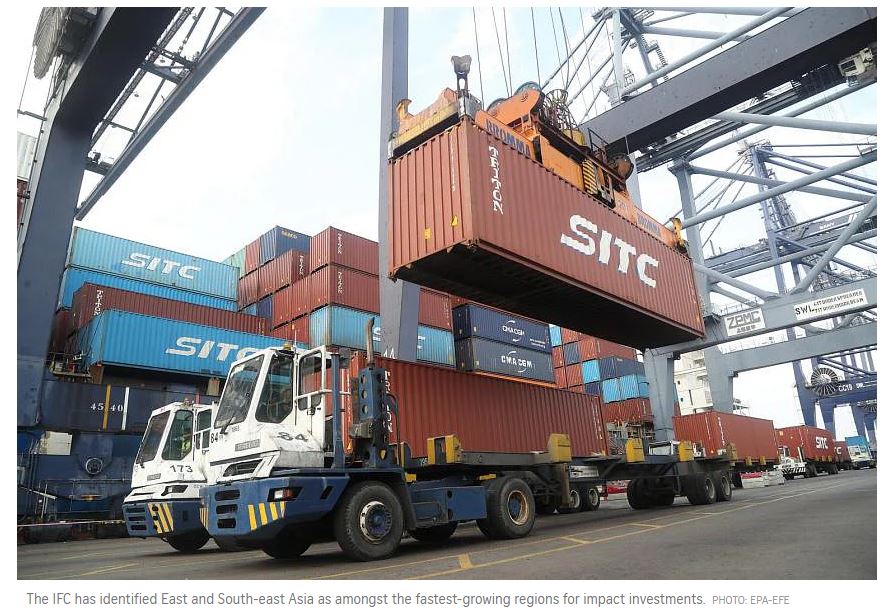More investors braving risk factor to make an impact in Asia
SINGAPORE – Asia is gaining ground as a destination for environmental, social and governance (ESG) investments, even though the region’s emerging markets are still relatively less mature.
The International Finance Corporation (IFC) has identified East and South-east Asia as “among the fastest-growing regions for impact investments”, said Justin Pooley, ESG manager for Asia and the Pacific at the World Bank-linked institution.
But he warned that the region remains “under-represented” despite its population size and its “needs and opportunities”. “While ESG investment opportunities have been widely recognised and leveraged in some countries, considerable untapped opportunities still exist in countries such as India, Bangladesh, Thailand, and Indonesia,” Pooley said.
Stephen Lee, director of private equity impact investing at Nuveen, noted that the firm’s own investors may “perceive Asian markets to be differentially risky”, which is a challenge.
“We have to continue to make the case that their perception of risk does not match the reality we observe in these markets – and that there are very attractive investment opportunities that can generate strong financial results alongside significant social and environmental results,” Lee said. “We expect Asean to continue to mature in terms of information sources and opportunities for ESG and impact investment.”
On the United Nations Development Programme (UNDP) platform for Sustainable Development Goals (SDG) investment, Asian markets are making up a growing share of the more than 20 country-specific SDG Investor Maps. Beyond India and China, the investor guides have branched out into regional markets such as Indonesia and Sri Lanka.
Aphinya Siranart, head of exploration at UNDP Accelerator Labs, called SDG impact investment “one of our strategic priorities”, and toldThe Business Times that maps for Vietnam, Laos, the Philippines and Malaysia are already in the pipeline.
“The readiness of each country is different and that’s why the launching timeline for each country is different,” she said, pointing to both internal factors such as UNDP capacity, as well as the availability of data for countries under consideration.
The UNDP’s Thailand SDG Investor Map, unveiled in July, identified 15 investment areas such as telehealth, business micro-credit, eco-tourism, and “alternative proteins”.
The map for Cambodia, published in end-August, spotlighted a similar number of investment areas, as well as 10 so-called “white spaces” that “require more private sector participation or a scope for more policy support” to achieve growth potential.
Public-private partnerships for digital learning, consultancy services for energy efficiency, and the development of a “small and medium enterprise cluster park” focused on agriculture were among the investment white spaces identified.
“The market intelligence generated by the map will guide private-sector investors looking to invest sustainably, profitably, and with the confidence that the sectors identified respond to the national development priorities,” UNDP Cambodia resident representative Alissar Chaker said in a press statement at the time.
Said Janette Hall, director of investment funds and special initiatives division at the Asian Development Bank: “The UNDP platform will become particularly valuable from an Asian perspective, when it expands to reflect a growing range of opportunities in the region.”
She noted that emerging markets in the Asia-Pacific “are less developed”, with fewer publicly listed companies and lower ESG disclosure rules.
“However, Asia offers ample opportunities for scaling up ESG investments and financing in climate-related sectors such as renewable energy,” she told BT.
Other sectors that she cited include green infrastructure – such as transport and the built environment – as well as agri-business, health, education, and small-business financing.
She also noted that “there is significant room for expansion” in ESG-related exchange traded funds (ETFs) for emerging Asia, given how mutual funds and ETFs let investors of all sizes “easily gain exposure to balanced portfolios of listed ESG-related stocks”. THE BUSINESS TIMES


 English
English




